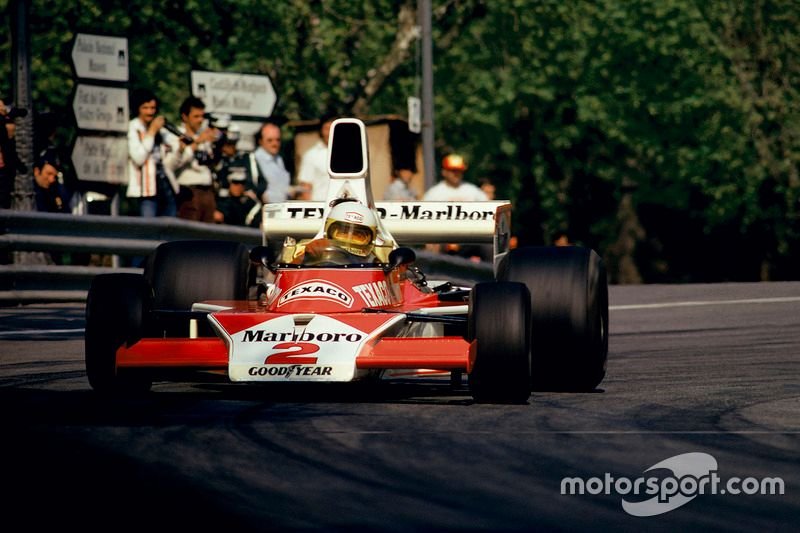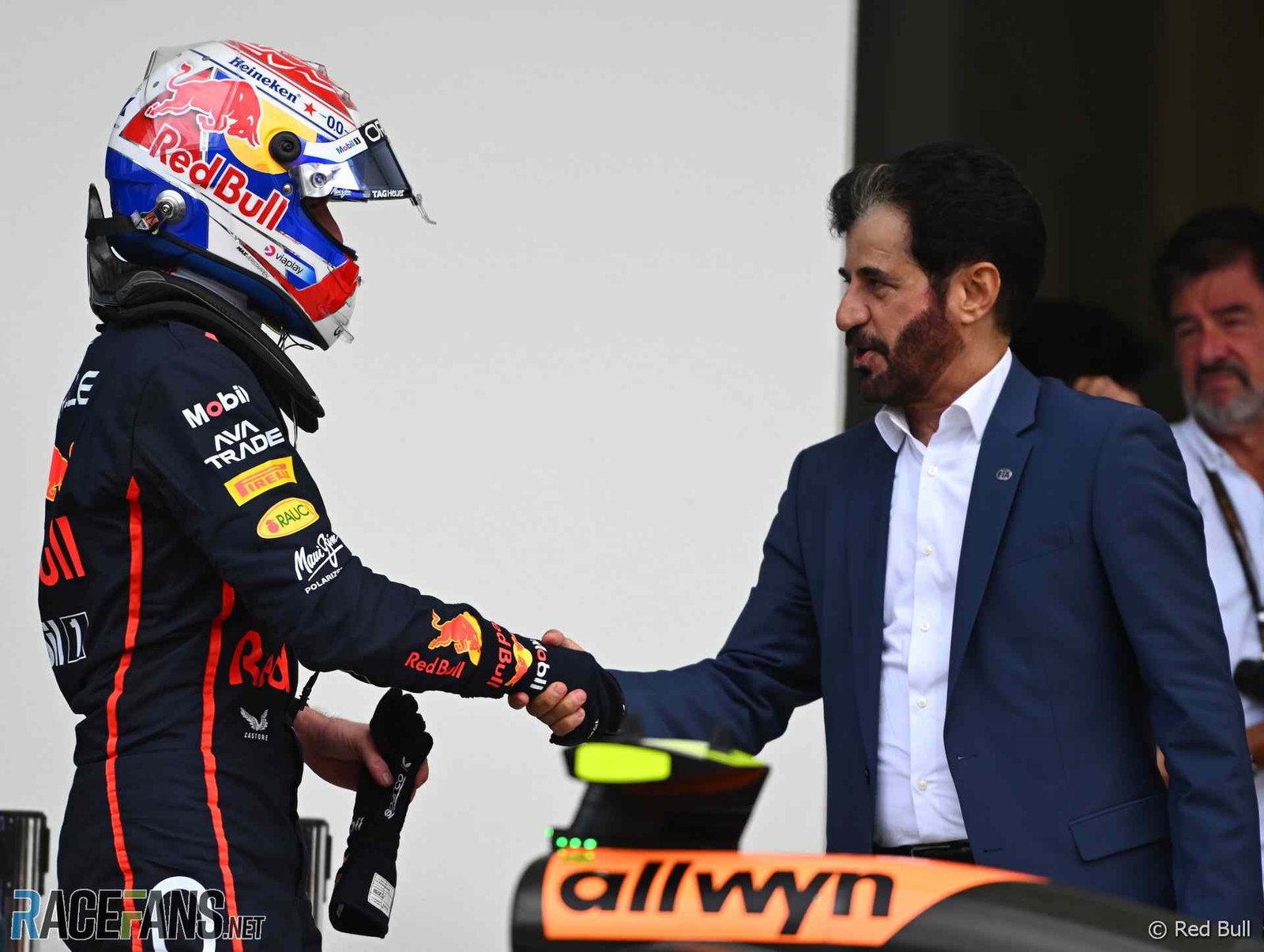Jochen Mass disproved the saying that nice guys finish last. A charming man who was universally liked, the German was a race winner in Formula 1 and one of the top sportscar drivers of his generation, claiming a victory in the Le Mans 24 Hours. But perhaps the German, who has died aged 78 from complications following a stroke, was just too nice to truly make his mark at the pinnacle of the sport during an F1 career than stretched over nine seasons and 105 starts.
Alastair Caldwell, team manager at McLaren during Mass’s three-and-a-bit-year stint, certainly thinks so. “You’d have to say in retrospect that Jochen was too nice,” he says. “He was a lovely man, affable, funny, good company and interested in other things in life than motor racing, like sailing and his yachts.”
Mass had joined McLaren from Surtees at the back end of 1974, contesting the final two races in the seat vacated by Mike Hailwood after the latter sustained serious leg injuries at the German Grand Prix. When two-time F1 world champion Emerson Fittipaldi jumped ship at the end of ’75 to race for the family team started by brother Wilson, Mass appeared to have his big chance. There were still doubts about new team-mate James Hunt, victory in the Dutch GP at Zandvoort with Hesketh in ’75 notwithstanding.
“I remember flying out to Sao Paolo for the first race at Interlagos and Jochen asking me on the plane who was the number one driver,” recalls Caldwell. “I told him that whoever is quickest is the number one driver.”
The dye was cast when Hunt put his McLaren-Cosworth M23 on pole in Brazil and again second time out at Kyalami in South Africa. McLaren’s de facto new number one would go on to claim the world championship while Mass sneaked into the top 10 in the points, twice scoring a best result of third along the way.
But Mass should have won a race that year. He arguably had more right to victory at the Nurburgring in ’76 than he did to his one and only F1 win at the tragic and foreshortened Spanish Grand Prix the previous year.
Caldwell reveals that it had been agreed that Mass would pull into the pits after the opening lap of the race in protest at the levels of safety at the Montjuic Park street circuit in Barcelona – Fittipaldi had completed a handful of laps in practice and already decided not to race. But Mass didn’t stick to the plan. “When the flag fell, the red mist came down,” says Caldwell.
Mass moved his M23 into the lead when Rolf Stommelen crashed the brand-new Hill GH1. He briefly lost it to Jacky Ickx’s Lotus before regaining the top spot. Their battle raged even though Stommelen had cleared the barriers after a rear wing failure, his flying car killing a spectator, a track worker and two photographers. Only after four laps was the race red-flagged and Mass declared the winner. He only received half championship points because the race was halted prior to the completion of 60% of the scheduled race distance.

Jochen Mass, McLaren M23-Cosworth
Photo by: Motorsport Images
If there was luck involved in the Montjuic victory, misfortune deprived him of another at the ‘Ring 15 months later. Rain before the race started resulted in everyone taking on wets apart from Mass. It was an inspired decision that would almost certainly have resulted in a victory had the race not been temporarily halted after lap two following the crash that left Ferrari driver Niki Lauda with life-threatening injuries.
Caldwell, who engineered Mass’s car, revealed that the decision had been made after a discussion with the driver of a course vehicle sent out after the rain had started.
“Everyone listened to what the driver of this super-duper Porsche that had been around the track had to say, and then decided on wets,” remembers Caldwell. “But Jochen and I went and had another word with him and we decided that it sounded like only five kilometres [of a track measuring 22km or 14 miles] or so were truly wet. We agreed that we should take a gamble on slicks.
“I remember Jochen telling me that at the Foxhole [Fuchsrohre] he only stayed on the road because other cars were banging wheels with him. By the end of the second lap, he had a massive lead before the race was stopped. He was going to win that race by a mile because everyone else had to pit for dry tyres.” He ended up third, nearly a minute behind Hunt.

James Hunt, 1st position, Jody Scheckter, 2nd position and Jochen Mass, 3rd position
Photo by: Sutton Images
Mass’ eighth and last podium in F1 occurred in his final year with McLaren in ’77 at the Canadian Grand Prix. Hunt’s superiority was brought into focus around the Mosport circuit: the Briton was on course for victory when he tangled with his team-mate while lapping him.
Mass’s career never regained momentum after his departure from McLaren. A season at ATS in ’78 was brought to a premature end with a major accident in testing at Silverstone, which left him with a broken leg and a punctured lung. While recovering from his injuries, he was sounded out by Frank Williams about joining his team for ’79 as it expanded to two cars. He also had an offer on the table from another promising young team in Arrows.
Mass chose Arrows and Williams turned to veteran Clay Regazzoni, who would score the team’s first victory at the ’79 British GP at Silverstone in the new FW07. Mass admitted that he kicked himself about that one, his two-year stint at Arrows yielding nothing better than a fourth place. After a season out of F1, he returned with the RAM March team in 1982, only to walk away after a massive shunt in the French Grand Prix at Ricard from which he escaped uninjured.

Jochen Mass, Arrows A1B finished the race in twelfth position
Photo by: David Phipps
Mass’s F1 career ended in the first season of the Group C rules that rejuvenated international sportscar racing. Already a regular with Porsche, he became a stalwart of its factory campaigns with the 956 and the 962C, claiming nine world championship victories between ’82 and ’85.
Derek Bell was a team-mate of Mass’s during that time, though on the other side of the garage, and remembers “a laid-back cuddly man” and “such a nice bloke”. He likens him to a big teddy bear: “Warm and cuddly, but as strong as an ox and as tough as they come.”
Mass enjoyed his biggest successes in long-distance racing. His career break came for 1970 when he was picked up by Ford for touring cars after only beginning racing at the age of 21 following a three-year stint as merchant seaman. He would win the Spa 24 Hours in 1972 with Ford’s Capri RS2600 and the marque facilitated his move to Formula 2, brokering a deal for Mass to race with the March works team in selected races in ’72.
He was a regular with Porsche from 1976, scoring victories in the two concurrent world series that year: he was five times a winner aboard the 936 Group 6 prototype in the World Sportscar Championship and three times in the World Championship of Makes in the 935 Group 5 silhouette racer.

#2 Rothmans Porsche Porsche 956: Jochen Mass, Stefan Bellof
Photo by: Jean-Philippe Legrand
As Porsche downscaled its factory programme, Mass moved over to Mercedes for 1988, though not before winning four rounds of the IMSA GT Championship at the wheel of a Bayside customer 962 in ’87, the Sebring 12 Hours included. Mercedes had firmed up its relationship with the Sauber team, officially re-entering circuit racing for the first time since the 1955 Le Mans disaster, and its motorsport boss Jochen Neerpasch recruited Mass for a second time – he had been at the helm at Ford nearly 20 years before.
Mass would take a further 10 Group C victories, aboard the Sauber-Mercedes C9 and then the Mercedes C11. He would end up with a total of 32 wins over the various iterations of the former world sportscar championship. That puts him only second to Le Mans legend Ickx in the all-time winners’ list of a series that came to an end after 1992.
Not among those 32 triumphs was Le Mans 1989. It wasn’t a championship round the year Mass triumphed with Manuel Reuter and Stanley Dickens in a C9. But it was one two years later when, aboard a C11 shared with Jean-Louis Schlesser and Alain Ferte, he was on course for a second victory until a freak failure in the 22nd hour. An alternator bracket, a component weakened because it had been anodised to make it look pretty since the ’89 race, failed.

#63 Team Sauber Mercedes, Sauber C9 Mercedes-Benz: Jochen Mass, Manuel Reuter, Stanley Dickens
Photo by: Daimler AG
For all his successes with Mercedes and Sauber, the four-year stint racing the Silver Arrows that pretty much rounded out his career is arguably best remembered for his involvement in nurturing a new generation of talent: his laid-back persona explains why Neerpasch turned to him to be the mentor for the German manufacturer’s junior programme with which Michael Schumacher, Heinz-Harald Frentzen and Karl Wendlinger stepped up from Formula 3 to the World Sports-Prototype Championship.
The three were “welcomed with open arms” by the veteran, remembers Wendlinger. “There was never any ego: he never tried to keep anything from us to give himself an advantage on lap time,” he explains. “He answered every question we had – there were never any secrets.
“Jochen made it an easy start for us as we were going from a 170bhp F3 car to a big and powerful Group C with a lot of downforce. That was an important time in my career and I would say Jochen was a big reason why it worked so well.”
After departing Sauber at the end of ’91, Mass effectively stepped away from the cockpit. He did, however, make a one-off return for a 12th and final Le Mans start in ’95. Mass was brought in to share the David Price Racing-run West Competition McLaren F1 GTR and might have claimed victory at the French enduro. The car led in his and John Nielsen’s hands for much of the first half of the race in dreadful conditions before requiring a change of clutch.
Mass always retained a link with motorsport in spite of his diverse interests; it shouldn’t be forgotten that he was a partner in the MS-Jet Racing DTM team of the late 80s and early 90s. He was a co-commentator in F1 with RTL in the 1990s and subsequently became an ambassador for Mercedes.
In this article
Gary Watkins
Formula 1
Le Mans
WEC
Jochen Mass
Be the first to know and subscribe for real-time news email updates on these topics
Subscribe to news alerts














Leave a Reply